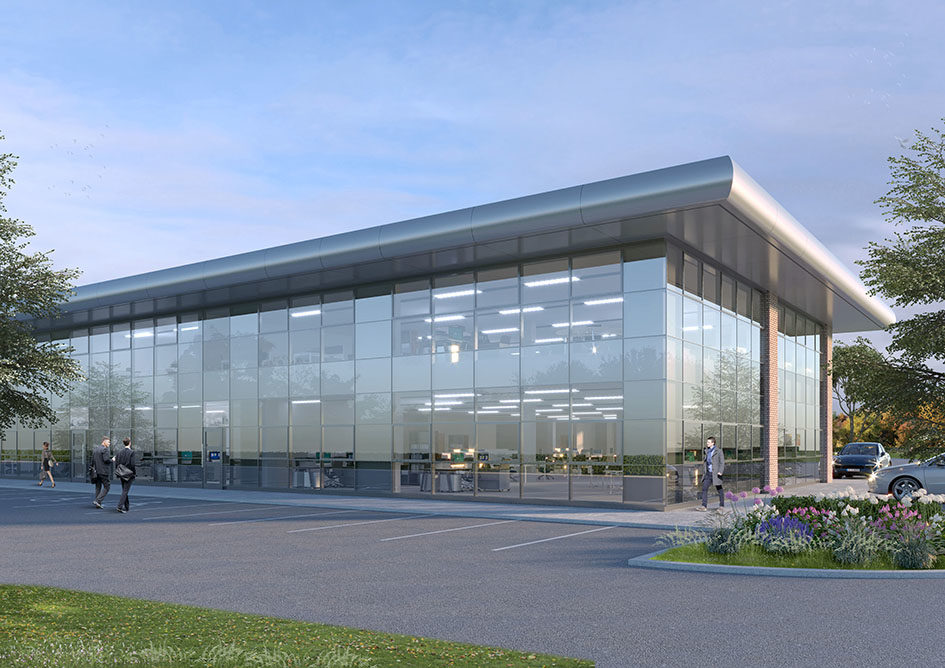FANUC shows commitment to Ireland’s Industry 4.0 and Future Jobs strategy with dedicated new robotics facility
Roughly a year after FANUC announced, in June 2021, that it intended to serve customers from premises in Ireland with a dedicated team and full local representation, this summer will see the robotics and automation company collect the keys for its new facility in Maynooth, Co Kildare. Off the back of a strong start to this fiscal year – and coinciding with FANUC’s attendance at the GTMA Manufacturing Solutions Ireland event (15-16 June, Technological University Shannon, Limerick) as well as its appearance at the International Society of Pharmaceutical Engineers’ exhibition in early May – the company is demonstrating a strong commitment to its growing Irish customer base, supporting the government’s aim to place the country at the forefront of the Fourth Industrial Revolution by 2025.
“We announced that we planned to have an initial team of five and here we are, as promised,” says Conor O’Kelly, one of two Ireland-based Sales Managers now in place; the other is Ronan Rasdale. Two Service Engineers and a Technical Support Engineer complete the team.
There have been plans for an Irish subsidiary of FANUC Europe for a while; the impact of Covid-19 and the restrictions on international travel accelerated them. “Previously, our Irish customers would have had to travel to Coventry in England, but we can now offer organised, in-house training for our larger customers and scheduled courses catering for smaller groups, from our dedicated Irish facility here in Maynooth,” continues Conor. “In addition, the showroom at our new headquarters will be stocked with robots for demonstration, evaluation and test purposes.”
Manufacturing matters
Most of the island is reachable from Maynooth in about three hours, and many of FANUC’s customers and partners are within 90 minutes’ drive of the new facility. Its launch could not be timelier, coinciding with the implementation of the Irish Government’s wider industrial strategy. According to the ‘Making it in Ireland: Manufacturing 2020’ report, Ireland’s manufacturing sector contributes 25% of GDP and employs 205,700 people directly, rising to 400,000 when indirect employment is considered.
There were 16,700 firms in the manufacturing sector in Ireland in 2017, with Irish-owned companies representing 97% of these. At 35%, manufacturing’s share of Ireland’s GVA (gross value add) is more than double the average of the Euro area. ‘Ireland’s Industry 4.0 Strategy 2020-2025’ is a key output of Future Jobs Ireland, the Government’s economic pathway.
“Ireland doesn’t have a traditional industrial background in, for example, automotive manufacture but we make a lot of agricultural machinery, and the country has established a global reputation in pharmaceuticals, chemicals, food and beverage, medical devices, computers, electronics and engineering. SMEs account for a significant proportion in those key sectors,” says Conor, whose own background is in life sciences.

Conor O’Kelly, one of two, Ireland-based Sales Managers
Industry 4.0: the need for automation
The emergence of advanced industrial technologies, including digitalisation, is so transformational that it has been called the Fourth Industrial Revolution, or Industry 4.0. Firms of all sizes will face challenges in developing and adopting appropriate strategies that will be crucial to maintaining a competitive manufacturing base in Ireland into the future, according to the Government. Ireland currently lags behind the European average in robot penetration, with the second-lowest robot density in the EU15 in 2019. However, the Irish Government’s strategy is that, by 2025, Ireland will be a competitive, innovation-driven manufacturing hub and at the forefront of Industry 4.0 development and adoption.
FANUC believes that it is ideally placed to help Irish businesses close the gap and profit from the new opportunities, supported by its network of expert integrator partners. “We manufacture and supply robot arms, whether floor-mounted or bench-mounted, along with other peripherals like vision systems and sensing systems, for applications ranging from packing and palletising to picking and placing,” explains Conor. “As well as our strong reputation for developing in-house systems, we also work with a range of specialist integrators to ensure we offer the most competitive options for our customers, as well as ensuring each solution accurately matches the individual application demands.”
The company has several hundred robots already installed in Ireland and the new facility at Maynooth means that technical support will now also be available to businesses that may have bought FANUC equipment through integrators outside the previous network. “We are now much better placed to provide effective support to our existing customers in Ireland,” says Conor.
The team is also looking forward to introducing new customers to the global reach and resources of FANUC and to sharing the benefits of its experience and expertise gained in America, where it has a huge market share, as well as across Europe and the rest of the world. If a business has an issue with automation, the likelihood is that FANUC will have encountered it already.

This summer will see the robotics and automation company collect the keys for its new facility in Maynooth, Co Kildare
Prioritising education and training
The opportunity is there for Irish manufacturers to increase their competitiveness, both domestically and internationally. “However, in order to maximise this, the next step is most definitely around automation. It is essential to competitiveness,” states Conor. “If a foreign-owned plant in this country is up against a sister plant elsewhere in the world for the next generation of a product it is already making, efficiency achieved through automation will be essential to winning the business and keeping it under their roof. I’ve been really impressed with the way some owner-managed SME businesses have bit the bullet and invested in automation – and they haven’t regretted it.”
FANUC recognises the importance of education and training to the future that Ireland and its businesses want to embrace. As well as providing on-site training at larger customers’ facilities and at the new offices in Maynooth, FANUC is continuing to work closely with Ireland’s higher education network, including the Technical Universities, and with manufacturers’ apprenticeship programmes.
“The indicators are very strongly pointing towards more investment in manufacturing equipment in Ireland,” says Conor. “The country’s technologically advanced, efficient and competitive future manufacturing sector and its supply chain is one that FANUC Ireland will be at heart of.”
Join FANUC Ireland on Stand M4 at the GTMA Manufacturing Solutions Ireland event, 15-16 June 2022, Technological University Shannon (TUS) Moylish Park Campus, Limerick.
https://www.gtma.co.uk/manufacturing-solutions-limerick-15th-16th-june-2022/
For more information on how FANUC’s range of robotics and automation solutions can transform your manufacturing business, contact sales@fanuc.co.uk







